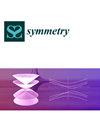适合模糊连接泛化的多项式自同构的生成
IF 2.2
3区 综合性期刊
Q2 MULTIDISCIPLINARY SCIENCES
引用次数: 0
摘要
模糊逻辑正在成为现代数学中最具影响力的领域之一,其应用不仅影响其他科学,而且影响整个社会。这种对模糊逻辑的新兴趣部分是由于它在人工智能的发展中起着至关重要的作用。因此,对开发上述领域的新工具和新实践的需求很大。这是本文所要解决的问题之一。更具体地说,模糊逻辑的相当一部分是对模糊连接词的研究。然而,目前用于泛化它们的方法仅限于使用基本自同构,这阻碍了新的模糊连接词的创建。为此,本文提出了一种新的泛化方法,即利用多项式自同构函数对模糊连接进行泛化。这些自同构的创建是通过数值分析实现的,这一努力得到了编程应用程序的支持,这些应用程序使用数学建模来验证和可视化研究。此外,自同构满足泛化过程中建立的所有必要条件,因此可以成功地泛化模糊连接词。新的泛化方法的结果是创造了新的可用的、灵活的模糊连接词,这对该领域的未来发展是非常有希望的。本文章由计算机程序翻译,如有差异,请以英文原文为准。
Generation of Polynomial Automorphisms Appropriate for the Generalization of Fuzzy Connectives
Fuzzy logic is becoming one of the most-influential fields of modern mathematics with applications that impact not only other sciences, but society in general. This newly found interest in fuzzy logic is in part due to the crucial role it plays in the development of artificial intelligence. As a result, new tools and practices for the development of the above-mentioned field are in high demand. This is one of the issues this paper was composed to address. To be more specific, a sizable part of fuzzy logic is the study of fuzzy connectives. However, the current method used to generalize them is restricted to the use of basic automorphisms, which hinders the creation of new fuzzy connectives. For this reason, in this paper, a new method of generalization is conceived of that aims to generalize the fuzzy connectives using polynomial automorphism functions instead. The creation of these automorphisms is achieved through numerical analysis, an endeavor that is supported with programming applications that, using mathematical modeling, validate and visualize the research. Furthermore, the automorphisms satisfy all the necessary criteria that have been established for use in the generalization process and, consequently, are used to successfully generalize fuzzy connectives. The result of the new generalization method is the creation of new usable and flexible fuzzy connectives, which is very promising for the future development of the field.
求助全文
通过发布文献求助,成功后即可免费获取论文全文。
去求助
来源期刊

Symmetry-Basel
MULTIDISCIPLINARY SCIENCES-
CiteScore
5.40
自引率
11.10%
发文量
2276
审稿时长
14.88 days
期刊介绍:
Symmetry (ISSN 2073-8994), an international and interdisciplinary scientific journal, publishes reviews, regular research papers and short notes. Our aim is to encourage scientists to publish their experimental and theoretical research in as much detail as possible. There is no restriction on the length of the papers. Full experimental and/or methodical details must be provided, so that results can be reproduced.
 求助内容:
求助内容: 应助结果提醒方式:
应助结果提醒方式:


